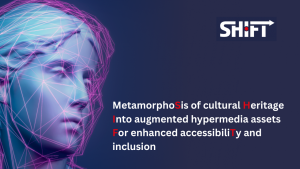Critical challenges in the way we experience heritage in the realm of museums
By Dr. George Margetis
The SHIFT project, funded by the European Commission’s Horizon Europe Program, comes to revitalize how we experience cultural heritage by matching innovation with tradition and creating multi-sensory heritage encounters that transcend boundaries and welcome everyone.
More specifically, SHIFT aims to unlock the past for everyone and is committed to accessibility and inclusivity, ensuring that cultural heritage becomes accessible to all, and allowing everyone to connect with their heritage regardless of background or ability. Emphasizing also that diversity matters, SHIFT pursues to empower people with disabilities to enrich their perspectives and foster their understanding.
SHIFT is addressing the critical challenges we encounter in the realm of museums. These are:
Challenge 1: diverse heritage, diverse needs.
Our cultural heritage often excludes individuals of diverse backgrounds from fully engaging with it.
Challenge 2: physical barriers transform heritage exploration into a struggle for individuals with mobility challenges.
Limited access narrows their ability to engage with exhibits, diminishing their capacity to immerse themselves in their stories.
Challenge 3: language and cognitive barriers.
The language barrier and cognitive disabilities create a divide leaving visitors disconnected from heritage stories.
Challenge 4: exclusion of sensory diversity.
Many cultural experiences focus on sight and sound, excluding those who experience the world differently.
Challenge 5: theater of inclusivity.
Museums should prioritize inclusivity for all visitors but certain interactive elements and live performances may unintentionally exclude individuals with varying abilities.
The SHIFT project consortium that consists of 13 European partners, is tackling these challenges head-on, reimagining accessibility to cultural heritage through innovative and inclusive approaches.
By addressing these issues we pave the way to a more accessible and enriching cultural experience for all.
Dr. George Margetis, is a postdoctoral researcher with the Human-Computer Interaction Laboratory of The Institute of Computer Science of FORTH. The HCI lab is leading SHIFT’s Work Package 3 implementation, catering to the accessibility of cultural heritage assets and improving the user experience of people with visual impairments. This opinion piece was originally part of a presentation for the webinar held to celebrate European Heritage Days 2023. You can watch the entire webinar that was hosted by HERITΛGE here.

